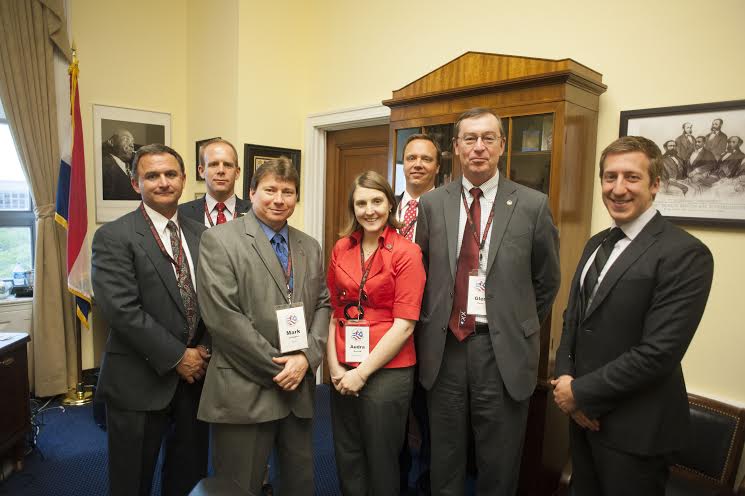Maritime Sail-In Keeps Congress Informed
Photo (L to R): Chris Guerra, M.E.B.A; Don Josberger, MM&P; Kayla Turner, The Maritime Executive; Cong. Tim Bishop (D-Southampton, NY – 1); Kate Ballengee, Metro Group Maritime; Terry Turner, Turner Pollard Strategies. Photo Credit: Brian Ahern, Seafarers International Union.
By Audra Kincaid and Kayla Turner
Last week an estimated 130 maritime industry professionals came together in Washington, DC to spread awareness of the industry on Capitol Hill and educate members of Congress on its importance. The 5th Annual Congressional Maritime Sail-In on May 7 brought together virtually every segment of the industry – owners, operators, unions, educators – to dialogue with members on the vital role the domestic maritime industry plays in ensuring America’s economic prosperity and military readiness.
173 meetings with congressional members and their staffers were held – 47 on the Senate side and 126 on the House side. The big issues were (1) full funding for the Maritime Security Program (MSP), (2) reauthorization of the Export-Import Bank of the United States, (3) support for Food Aid and Cargo Preference, and (4) preservation of the Jones Act.
Photo (L to R): Captain Joe Hartnett,Council of American Master Mariners; Capt. Joe Schwartzstein, Association of the MD Pilots; Mark Gallagher, M.E.B.A. Contracts; Audra Kincaid, The Maritime Executive; Klaus Luhta, MM&P Chief of Staff; Glen Paine, MITAGS Executive Director; and Taylor Share, Legislative Assistant for Rep. Emanuel Clever ( D-MO-5). Photo by Nick Barton.

The hot ticket item of MSP funding centered on ensuring that the program receives its full authorization of $186 million for FY 2015. Unfortunately, early last week a House subcommittee proposed a $20 million cut to the program, which could result in a loss of seven ships that are essential to U.S. sealift capability. Additionally, a budget cut would result in the elimination of hundreds of U.S. mariner jobs. The industry needs to make its voice heard on this one.
Sail-In attendees also asked members to support the reauthorization of the Export-Import Bank when its charter expires on September 30. The Bank helped support over $37 billion in export sales in FY 2013. It also requires that a percentage of those exports be carried on U.S.-flag commercial vessels, thereby providing a critical source of cargo for the domestic fleet.
Food Aid & Cargo Preference
Food Aid and Cargo Preference were also addressed. Sail-In participants asked members to support H.R. 4005, the Coast Guard & Maritime Transportation Act, which is the authorizing legislation for the Coast Guard’s FY 2015 budget. H.R. 4005 also includes language that would restore the share of food aid cargoes carried by U.S.-flag vessels to 75 percent. This number was reduced to 50 percent in 2012 and severely impacted the U.S.-flag commercial fleet.
In a related move, attendees asked members to reject the White House’s proposed changes to the Food for Peace (P.L. 480) program, which would further reduce the amount of in-kind food assistance carried overseas by U.S. ships in favor of direct cash payments to local NGOs. This disastrous change would threaten both the U.S. maritime and agricultural industries.
Strong support for and preservation of the Jones Act were also requested from Congress. Attendees emphasized that this key law helps ensure the economic prosperity, military readiness, and national defense of the United States. Without it, foreign vessels and crews would be allowed to transit freely along our coastlines and inland waterways, threatening the security and viability of this great nation. – MarEx
Audra Kincaid and Kayla Turner are staff writers for the newsletter.
